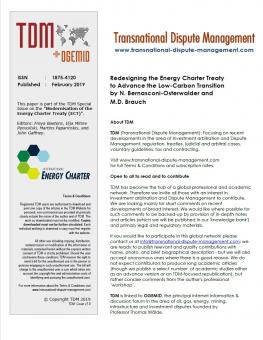
Redesigning the Energy Charter Treaty to Advance the Low-Carbon Transition
This paper discusses practical ways to overhaul the Energy Charter Treaty to bring it in line with international law commitments with respect to climate change and sustainable development.
The Energy Charter Treaty (ECT), if revised, could have a particularly important role to play, given the importance of the energy sector in relation to both contributing to global warming and providing climate change solutions.
Unlike most other investment treaties and chapters in trade agreements covering all sectors and measures indiscriminately, the ECT covers only activities in the energy sector. It covers a large range of activities relating to oil, gas, and coal, as well as wind and solar power and other renewable energy sources.
At a time when climate change is a top priority and the most pressing environmental and developmental issue for the future of our planet, a revised ECT should, from a normative perspective, play an important role in the transition from fossil fuel-based energy to renewable, clean energy.
In order to ensure mutual supportiveness between environmental and economic goals set at the international level, the ECT should be redesigned to bring it in line with—and help achieve—states’ international commitment under the Paris Agreement under the United Nations Framework Convention on Climate Change (UNFCCC).
This paper discusses the ECT and the Paris Agreement regimes and their inter-relationship, highlighting how they pull in different directions. It presents three building blocks that could be adopted in a revised ECT to align it with the Paris Agreement: encouraging low-carbon energy investments; discouraging carbon-intensive energy investments; and ensuring a just transition to low-carbon economies and societies. Finally, it proposes ways to reform the ECT through a climate lens as well as through a broader socioeconomic sustainability lens.
This paper was originally published in the Transnational Dispute Management (TDM) 1 (2019) "Modernisation of the Energy Charter Treaty (ECT)" Special Issue as N. Bernasconi-Osterwalder & M.D. Brauch; "Redesigning the Energy Charter Treaty to Advance the Low-Carbon Transition," TDM 1 (2019), available at https://www.transnational-dispute-management.com/article.asp?key=2632
Republished with permission from TDM.
You might also be interested in
IISD: EU’s historic Energy Charter Treaty vote will boost energy transition
The European Parliament has voted for the European Union to withdraw from the climate-threatening Energy Charter Treaty.
South African Fossil Fuel Subsidies Hit Record Highs as Country's Energy Crisis Deepens
South Africa's fossil fuel subsidies tripled between 2018 and 2023, hitting USD 7.5 billion, up from USD 2.9 billion 5 years earlier, a new report by IISD reveals.
Blackouts and Backsliding: Energy subsidies in South Africa 2023
Blackouts and Backsliding presents the latest energy subsidy data for South Africa.
Financial Benefit-Sharing Issues for Critical Minerals: Challenges and opportunities for producing countries
Exploring nuances in the key features of critical minerals and the new challenges and opportunities they present to fiscal regulation.